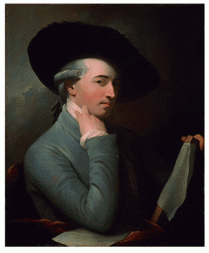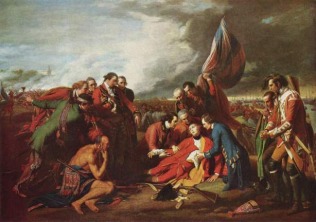The most interesting thing, however, is Americans' wish to claim West as a great American painter when he spent most of his life out of the country and parts of those years trying desperately to hide his "American-ness." He is certainly a great painter, but is he American? That is the question! (and possibly my thesis..blaaah! who knows though)
|
I was recently reading an article by Susan Rather on famous American artist Benjamin West. This article explores the complicated reputation of Benjamin West and national identity. Rather addresses the complicated issue for West who was born in America (Pennsylvania) but traveled (early twenties) to study in Italy and then moved to Britain for the remainder of his life. He becomes the second president of the Royal Academy in London and becomes painter to the King (George III). There is often debate on just how American Benjamin West should be considered to be after all this considerable time in England. West only lived in America when it was still considered a part of Britain anyways. The interesting thing about West is that throughout his lifetime he attempts to identify himself either as a British gentleman or a naive self-taught America depending on how it suits his career at the time. When he first moves to London he plays the part of the exciting new stranger from the new world, but when that novelty wears off he struggles to be seen as a British gentleman and he tries to hide some of his American qualities in order to be more readily accepted. What cannot be denied is his contributions to American art. He taught and nurtured many American students who came over to his London studio to learn painting. There were few alternatives and West set up this American “school” which gave a huge boost to the arts in the new republic. He does not, however, seem to consider presiding over this enterprise from his homeland. West seems to have fought for every bit of his reputation as a great painter, often competing with John Copley (another American) for attention. Many regarded him as quite full of himself as he had stationary printed with his self-portrait on it and metals cast with his face on one side and inscriptions such as, “Benjamin West/ aged seventy seven/ in the full possession of his powers/ and of his glory.” He also fought to get from under the shadows of Sir Joshua Reynolds fame. Reynolds' death only cements him in the canon of famous artists and West is left to hold the office of president of the Royal Academy directly after this highly regarded man. You can see his desperation when he announces that he will show his entire body of work (over a two year period as if to say he has such a huge catalog that it would be impossible to show it at one time) just after it is announced that an exhibition surveying Reynolds' work will be shown. He is also alarmed by the new found love of Hogarth’s work that is well underway by 1814. He worries that these two other artists will be remembered as founders of modern British painting instead of himself. It is around this time that he goes on a campaign of sorts to reestablish himself as that great, mysterious, rugged America painter full of raw, natural talent. He is freed to tell a quite entertaining (and most likely hyperbolic) version of his early American life after the deaths of some (including Copley) who would have jumped at the chance to discount it. His biography is filled with ridiculous stories that paint him as a boy genius who among other things was taught to paint by Native Americans and invented the artistic device known as the camera obscura without any prior knowledge of it! Record of West shows a man who is never quite satisfied. He does every thing possible to get attention and therefore get commissions for his livelihood. One can not blame him for trying to reinvent himself and make himself a commodity. This is what all good business men and women must do.
The most interesting thing, however, is Americans' wish to claim West as a great American painter when he spent most of his life out of the country and parts of those years trying desperately to hide his "American-ness." He is certainly a great painter, but is he American? That is the question! (and possibly my thesis..blaaah! who knows though)
2 Comments
becky
7/11/2010 10:46:23 am
by the portrait, i think he thinks very highly of himself. I think i would say he is british, since you said he was only in this country when we were still british and then spent most of the rest of his life in britain. interesting write-up of someone I had never heard of, learning new things from you.
Reply
Blake
8/8/2010 11:38:17 am
Amy, you have quite possibly one of the most interesting minds this side of the Mississippi. Judging by his self portrait, I don't think I would have cared for this guy. He seems like the kind of guy who would have been way to particular to paint the left side of his face rather than the right. And what is he doing with his hand?
Reply
Leave a Reply. |
AuthorAmy has a passion for art that has led her here. Archives
March 2011
Categories |


 RSS Feed
RSS Feed
